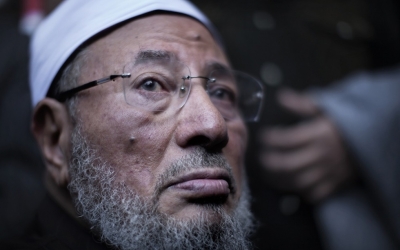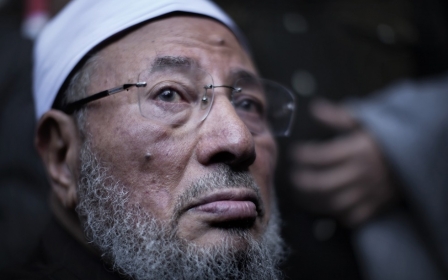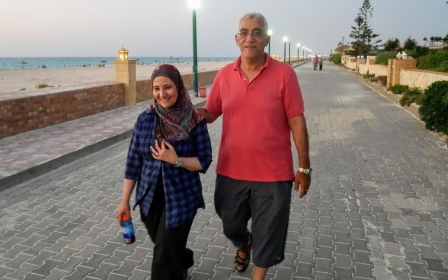Yusuf al-Qaradawi: Influential Muslim cleric dies at 96
Influential Egyptian Muslim cleric and thinker Yusuf al-Qaradawi has died in Qatar aged 96, according to a statement by the International Union of Muslim Scholars.
Qaradawi is among the Islamic world's most renowned - and controversial - clerics and public intellectuals, and is one of the few Muslim clerics who publicly backed the 2011 Arab Spring uprisings in Egypt and across the Arab world.
He was the founder and former chairman of the International Union of Islamic Scholars, a global union of Islamic intellectuals and clerics.
Qaradawi was born on 9 September 1926 in the village of Saft Turab in Egypt’s Nile Delta governorate of Gharbia. He was educated at al-Azhar University in Cairo, the Islamic world’s most prestigious religious institution, completing both his higher education and post-graduate studies in the same university until he obtained his PhD in 1973, with a focus on zakat tax and its social impacts.
Born in an Egypt that was still under British colonial rule, Qaradawi went on to become an anti-colonial activist, which led to his repeated detention by the government. He then supported the Muslim Brotherhood, the country’s largest Islamic and social group founded in 1928.
New MEE newsletter: Jerusalem Dispatch
Sign up to get the latest insights and analysis on Israel-Palestine, alongside Turkey Unpacked and other MEE newsletters
Qaradawi was among a number of people who were jailed repeatedly for their affiliation to the group, both under King Farouk in the 1940s and President Gamal Abdel Nasser’s rule in the 1950s.
Qaradawi eventually moved to Qatar in 1961, and was appointed dean of the faculty of Sharia at the newly established Qatar University. Qatar granted him citizenship in 1968.
Later he was a regular guest at the Doha-based Al Jazeera channel, and his appearance on the network’s main religious show, Sharia and Life, garnered millions of views from around the world.
The scholar returned to Egypt briefly in 2011, after the pro-democracy revolution that forced President Hosni Mubarak out of power. On 18 February that year, days after the resignation of Mubarak, Qaradawi led the Friday prayer with thousands of Egyptians gathering in Tahrir Square, the epicentre of the uprising in Cairo.
He addressed the sermon to both Muslims and Christians taking part in the protests. His first public appearance after decades in exile was viewed as highly symbolic of the freedoms that could be enshrined in post-revolution Egypt.
Though a senior Brotherhood leader, Mohamed Morsi, was elected president in June 2012, the experience of the group in power was short-lived. Morsi was ousted a year later in a military coup by his defence minister Abdel Fattah el-Sisi, who has been president since 2014.
After his coup, Sisi jailed most Brotherhood leaders, including Morsi, and the judiciary handed dozens of death sentences and lengthy prison terms to the group’s leaders, members and supporters. Qaradawi was among those sentenced to death, in absentia, in 2015, on charges of links to a 2011 mass jailbreak.
After more than six years in solitary confinement, Morsi died in a courtroom in 2019, and Qaradawi hailed him as a "martyr".
Despite his intellectual influence on the Muslim Brotherhood and apparent support for the group, Qaradawi turned down several requests by the group to hold senior positions in it.
His support for the Arab Spring and opposition to Sisi have been cited as one of the reasons for the diplomatic crisis between Doha and several Arab countries, which led to a four-year boycott of Qatar in 2017.
His organisation, the International Union of Islamic Scholars, was listed as a "terrorist organisation" by Egypt, Saudi Arabia, the United Arab Emirates and Bahrain after the rift, which ended after al-Ula summit last year.
His daughter, Ola al-Qaradawi, was detained on 30 June 2017 in Egypt, shortly after the economic blockade of Qatar began. She was released four years later, although her husband Hossam Khalaf remains in prison.
The couple was accused of links to the Muslim Brotherhood, which Egypt banned and branded as a "terrorist organisation" after Sisi's coup in 2013. Ola al-Qarawadi denies the accusations, branding them politically motivated.
Controversial opinions
Qaradawi supported democracy and the participation of political Islamic groups in elections. He also backed Hamas, the Palestinian movement that rules the Gaza Strip which is classifed as a terrorist group by many western countries (either its armed wing or in its entirety).
He denounced groups like al-Qaeda and the Islamic State as extremists.
Meanwhile, Qaradawi’s defence of Palestinian suicide bombings against Israel in the Second Intifada has brought accusations against him in the West, and also by his Arab foes, that his positions have led to later adoption of suicide bombings by terrorist groups around the world, despite his condemnation and rejection of these attacks.
Qaradawi was an opponent of the takfiri ideology embraced by Salafi-jihadist clerics, which accuses other Muslims of apostasy or prohibits peace with non-Muslims. His 2009 book The Law of Jihad outlined his criticism of the Salafi-jihadist ideology, and his support for international law and the United Nations.
His works have expressed commitment to pluralism and respect for the rights of minorities, and also urged Muslims living in western countries to respect their local laws.
He also advocated greater rights for women, and issued a religious ruling strictly prohibiting female genital mutilation, a practice that is often justified by hardline religious figures.
Qaradawi was accused of adopting sectarian rhetoric during the Arab Spring in Syria and Bahrain. He showed support for the uprising against Syrian President Bashar al-Assad, and denounced Iranian support for his rule.
At the same time, he did not support the uprising in Bahrain, claiming it was driven by sectarian motives from the Shia majority against the Sunni monarchy.
Middle East Eye delivers independent and unrivalled coverage and analysis of the Middle East, North Africa and beyond. To learn more about republishing this content and the associated fees, please fill out this form. More about MEE can be found here.





